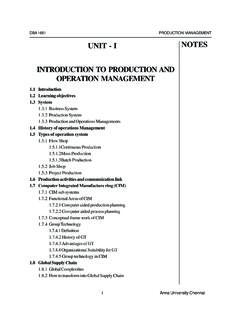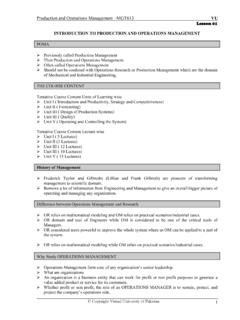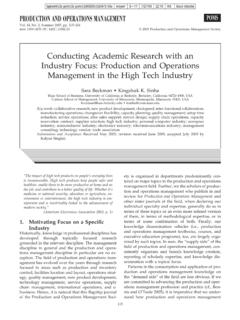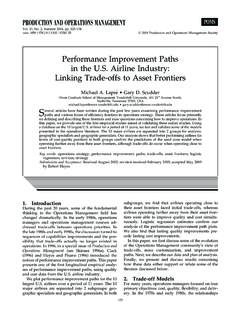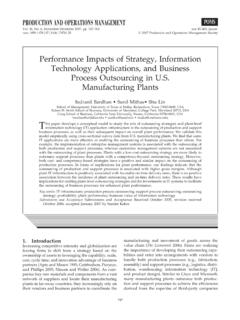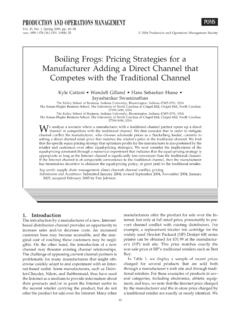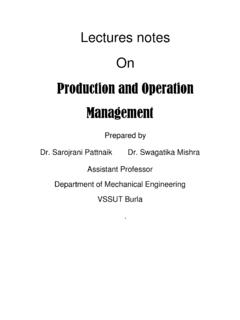Transcription of PRODUCTION AND OPERATIONS MANAGEMENT
1 THE FLAGSHIP RESEARCH JOURNAL OF PRODUCTION AND OPERATIONS MANAGEMENT SOCIETYV olume 22 Number 1 January February 2013 PRODUCTION AND OPERATIONS MANAGEMENT vi Mission Statements vii MANAGEMENT Insights 1 Arash Azadegan, Pankaj C. Patel, Vinit Parida Operational Slack and Venture Survival 19 Ernan Haruvy, Elena Katok Increasing Revenue by Decreasing Information in Procurement Auctions 36 Ravi Subramanian, Mark E. Ferguson, L. Beril Toktay Remanufacturing and the Component Commonality Decision 54 Karl Inderfurth, Rainer Kleber An Advanced Heuristic for Multiple-Option Spare Parts Procurement after End-of- PRODUCTION 71 Joern Meissner, Arne Strauss, Kalyan Talluri An Enhanced Concave Program Relaxation for Choice Network Revenue MANAGEMENT 88 Jian Yang, Yusen Xia A Nonatomic-Game Approach to Dynamic Pricing under Competition 104 Yulan Wang, Baozhuang Niu.
2 Pengfei Guo On the Advantage of Quantity Leadership When Outsourcing PRODUCTION to a Competitive Contract Manufacturer 120 Guoqiang Peter Zhang, Yusen Xia Does Quality Still Pay? A Reexamination of the Relationship Between Effective Quality MANAGEMENT and Firm Performance 137 Xinxin Hu, Haresh Gurnani, Ling Wang Managing Risk of Supply Disruptions: Incentives for Capacity Restoration 151 Jing Shao, Harish Krishnan, S. Thomas McCormick Distributing a Product Line in a Decentralized Supply Chain 164 Panos Kouvelis, Jian Li Offshore Outsourcing, Yield Uncertainty, and Contingency Responses 178 Baichun Feng, Tao Yao, Bin Jiang Analysis of the Market-Based Adjustable Outsourcing Contract under Uncertainties 189 Mingming Leng, Mahmut Parlar, Dengfeng Zhang The Retail Space-Exchange Problem with Pricing and Space Allocation Decisions 203 Antonio Arreola-Risa, Matthew F.
3 Keblis Design of Stockless PRODUCTION Systems 216 Ramon Alanis, Armann Ingolfsson, Bora Kolfal A Markov Chain Model for an EMS System with Repositioning Vol. 22, No. 1, January February 2013, pp. i PRODUCTION and OPERATIONS ManagementISSN 1059-1478 EISSN 1937-5956 13 2201 000i i12/14/2012 8:13:26 AM12/14/2012 8:13:26 AMMission StatementsIndustry Studies & Public PolicyThe department seeks papers that further our under-standing of OPERATIONS by explicitly accounting forindustry-specificcontextual detailsthat motivate,describe, or improve a firm s, organization s, orindustry s operational decisions or outcomes.
4 Studiesthat focus on industry specific considerations withrespect to competitiveness, disruptions, inventoryand logistics, productivity evolution, project manage-ment, product and service development, occupationalsafety, supply chains, sustainability, talent manage-ment, or technological choices are particularly wel-come. Studies are encouraged to dive deeply into aspecific industry ( the pharmaceuticals industry),and their findings need not generalize to other set-tings ( the automotive sector). However, the expo-sition must offer rich operational detail and explainhow findings hinge upon details that may be uniqueto the industry context.
5 We also encourage within-industry or cross-industry studies that examinepub-licpolicy optionsfor improving entrepreneurship,financing, information systems, innovation, sourcing,and trade practices in emergent industry sectors suchas alternative energy, bio-tech manufacturing anddigital must be well written with a clear statementof their contribution to both theory and practice. Weencourage a broad range of methodologies includinganalytical models, case work, econometric analysis,laboratory or field experiments and system chosen methodology should be well motivatedand executed with the highest InterfaceThe department seeks papers that improve our under-standing of how OPERATIONS MANAGEMENT impacts andis impacted by accounting institutions and of interest include but are not limited tofinancial reporting, incentive design, informationsharing, internal controls, inventory MANAGEMENT .
6 Organizational structure, outsourcing, performancemeasurement, supply chain contracting, taxation,transfer pricing, etc. The department is interdisciplin-ary, broadbased, and open to submissions utilizing avariety of methodologies ( , analytical, experimen-tal, empirical, survey). Contributors from any field( , accounting, economics, marketing, psychology, OPERATIONS ) are encouraged to submit papers that canfoster conversations between researchers and practi-tioners in accounting and InterfaceThe department seeks to publish manuscripts thataddress the synergy between OPERATIONS and market-ing.
7 Papers that fit four broad themes: shapingdemand for OPERATIONS and vice versa, trading offmarket opportunities with OPERATIONS complexity, OPERATIONS response to disruptions, and managingrelationships are of particular interest. This wouldinclude (but not limited to) topics such as buildingcapabilities, flexibility, emerging markets OM, life-cycles, preference mapping and variety, design anddevelopment, pricing and procurement, disruptionsand inventory, JIT and just-in-case, due dates, capac-ity trading, customer service and fulfillment, demanddecoupling and postponement, and customer/sup-plier should address important researchproblems and help stimulate future research.
8 Theyshould also be well executed, and be technically flaw-less. The articles may draw upon quantitative/quali-tative modeling, data analysis, simulation, andapplications. Irrespective of the research methodol-ogy, manuscripts must display rigor and managerialrelevance. Content must be original with significantcontributions to OM and marketing. Theoreticalmanuscripts should establish why certain decisionsare optimal. Domain specific empirical manuscriptsneed to provide generalization of methods andresults. Methodological manuscripts should clearlyestablish superiority of new methods over 22, No.
9 1, January February 2013, pp. |EISSN1937-5956|13|2201|00vi 2012 PRODUCTION and OPERATIONS MANAGEMENT SocietyManagement InsightsOperational Slack and Venture SurvivalArash Azadegan, Pankaj C. Patel, Vinit ParidaOperational slack, in the form of excess capacity, laboror physical excesses in the PRODUCTION process can actas an added expense that increase the chance of ven-ture failure. However, operational slack may also actas a buffer to protect the venture from external Azadegan, Pankaj Patel, and Vinit Paridainvestigate whether operational slack acts to help orhinder the survival of young ventures.
10 They find thatas a venture s environment becomes more dynamic,more complicated, or more harsh ( resource con-strained), operational slack helps to augment chancesof survival. These results suggest that operationalslack should not be simply regarded as systemicwaste for ventures. Nor should ventures be focusedon eliminating all of their excess capacity, labor orphysical assets. Second, the findings question whetherentrepreneurs should tolerate inadequacy of resourcesand enduring short-term sacrifices in the hopes offuture prosperity.


